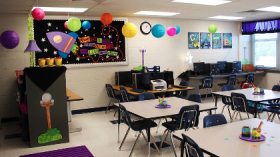Play spaces for all abilities
 One in twenty UK children has a disability or special education needs (SEN), yet many have no access to an outdoor space with play facilities. The United Nations Convention on the Rights of the Child says children have the right to play and the Association of Play Industries (API), the UK’s leading play industry trade body, supports that right.
One in twenty UK children has a disability or special education needs (SEN), yet many have no access to an outdoor space with play facilities. The United Nations Convention on the Rights of the Child says children have the right to play and the Association of Play Industries (API), the UK’s leading play industry trade body, supports that right.
Play matters
In the run up to the general election, the API is urging all political parties to make play a manifesto priority. Physical inactivity is one of the greatest health, societal and economic challenges of the 21st Century so it is vital that we tackle it from children’s earliest years – but there are many local communities where children have no safe places to play apart from at school. Schools have a major part to play in improving children’s physical literacy. Embedding a culture of physical activity into everyday school life is essential, both inside and outside the classroom. In practical terms, this means increasing the number, quality and variety of opportunities for children to be active throughout the school day.
Active outdoor learning and play at school are as important as PE and sport in encouraging children of all capabilities to be more physically active. Play improves concentration, classroom behaviour and academic performance too. The API hopes to see the government extend the Sport England Primary Spaces programme into every school, with broader scope to incorporate a wide variety of physical literacy activities, not just ball games. It would also like to see a measurable outcome for physical literacy in all schools. Agreed minimum levels of physical activity, outdoor learning and play would be mandated within the National Curriculum with outcomes assessed within the Ofsted framework.
The benefits of play
Research organisations, academic institutions, play campaigning organisations, education and health organisations, all report that active play delivers a wide range of benefits.
Emotional and behavioural benefits provide freedom, choice and independence, and reduces anxiety. Additionally, it improves concentration and focus, builds confidence and is particularly effective as a learning environment for boys and for those with special educational needs. Emotional and behavioural benefits also help children build resilience, experience challenge, deal with new situations and take risks in a positive way, while enhancing creativity, imagination, awareness, self-esteem, and self-respect.
The social benefits encourage exploration and discovery, while promoting team-work, problem-solving and leadership skills. It enables children to develop social skills, meet new people and socialise with friends. Socially, the benefits enable children of all abilities and backgrounds to play together and provide opportunities for learning. Environmentally, play improves interaction with the natural world and promotes environmental citizenship.
Diversity and confidence
Every school is unique with children with specific, sometimes complicated, requirements from wheelchair users and autism spectrum disorders to multiple disabilities and special needs. The design of any new playground or outdoor space must reflect that diversity to include equipment that not only stimulates physical activity but provides high-value sensory experiences too. Planning an outdoor play space for children with SEN requires care, consideration, expertise and experience, but when it comes to creating inclusive play facilities, we believe there are no limitations.
Well-designed play spaces provide safe environments that support sensory, emotional and physical stimulation, movement, mobility, balance, co-ordination and spatial skills.
They support social inclusion, integration, communication, confidence and self-esteem. Spaces should be adaptable and versatile to accommodate different types of play and provide an appropriate level of challenge. This takes children of all abilities outside their comfort zone, teaching valuable lessons about their capabilities and skills, building confidence in the process.
Some children can feel overwhelmed by large numbers of people, noise, colour or movement so breaking up an outdoor play or learning space into a number of smaller areas can be helpful. Zoned spaces using themed equipment or coloured surfacing, for example, provide distinct areas for children to enjoy different types of play. Quiet, sheltered areas are perfect for socialising, reading and small-group activities and might include elements such as sound, music or musical instruments, interesting or relaxing textures, gentle colours, mirrors, light panels and surfaces for mark-making. Meanwhile, bright, colourful areas with dynamic, moving, multi-level or multi-use equipment encourages more high-intensity activities.
While surface-level equipment provides fun for all children, it’s important to think about ways to provide great play value above ground level too. API member companies use their design expertise to create accessible routes to high points and levels, for example, with innovative use of landscaping, bridges, platforms and decks.
In schools, API members work closely with head teachers, governors, school business managers and staff throughout the planning stage, ensuring their investment offers excellent play value, clear educational and developmental benefits, accessibility and challenge for every child, whatever their skills and abilities.
Encouraging
Schools and local authorities play a vital role in encouraging children of all abilities to be active and many are investing in improving their outdoor spaces. When planning a new play area, API is the perfect first port of call for advice. Our website provides a wide range of helpful resources, information and links about fundraising, planning and project guidance, design, safety and risk, plus full details of every member company including examples of recent work. Understandably families want the best possible facilities for their children, whatever their abilities. Our member companies provide unrivalled expertise and experience to play buyers looking to improve accessibility within existing playgrounds or to create new inclusive outdoor spaces from scratch.
Child’s play is a serious matter. Choosing an API member company ensures means working with a reputable, reliable, financially stable and experienced play partner who understands the specific needs of children with different abilities.
Further information
www.api-play.org
Latest News
12/12/2025 - 11:39
The government has announced at least £3 billion to create tens of thousands of new speci
12/12/2025 - 07:07
The findings suggest that children and young people attending schools in the North of England are less likely to take part in and benefit from residential visits.
11/12/2025 - 13:52
Ofqual has launched a 12-week public consultation on its proposed approach to regulating on-screen exams in GCSEs, AS and A levels.
11/12/2025 - 09:49
A report by Ofsted and the Care Quality Commission (CQC) finds that support for children with special educational needs and/or disabilities (SEND) who do not attend school full-time is too inconsistent.
11/12/2025 - 09:37
The easy-to-use web-based tool is designed to help schools estimate how an air filter unit could impact air quality and energy consumption in a classroom.







